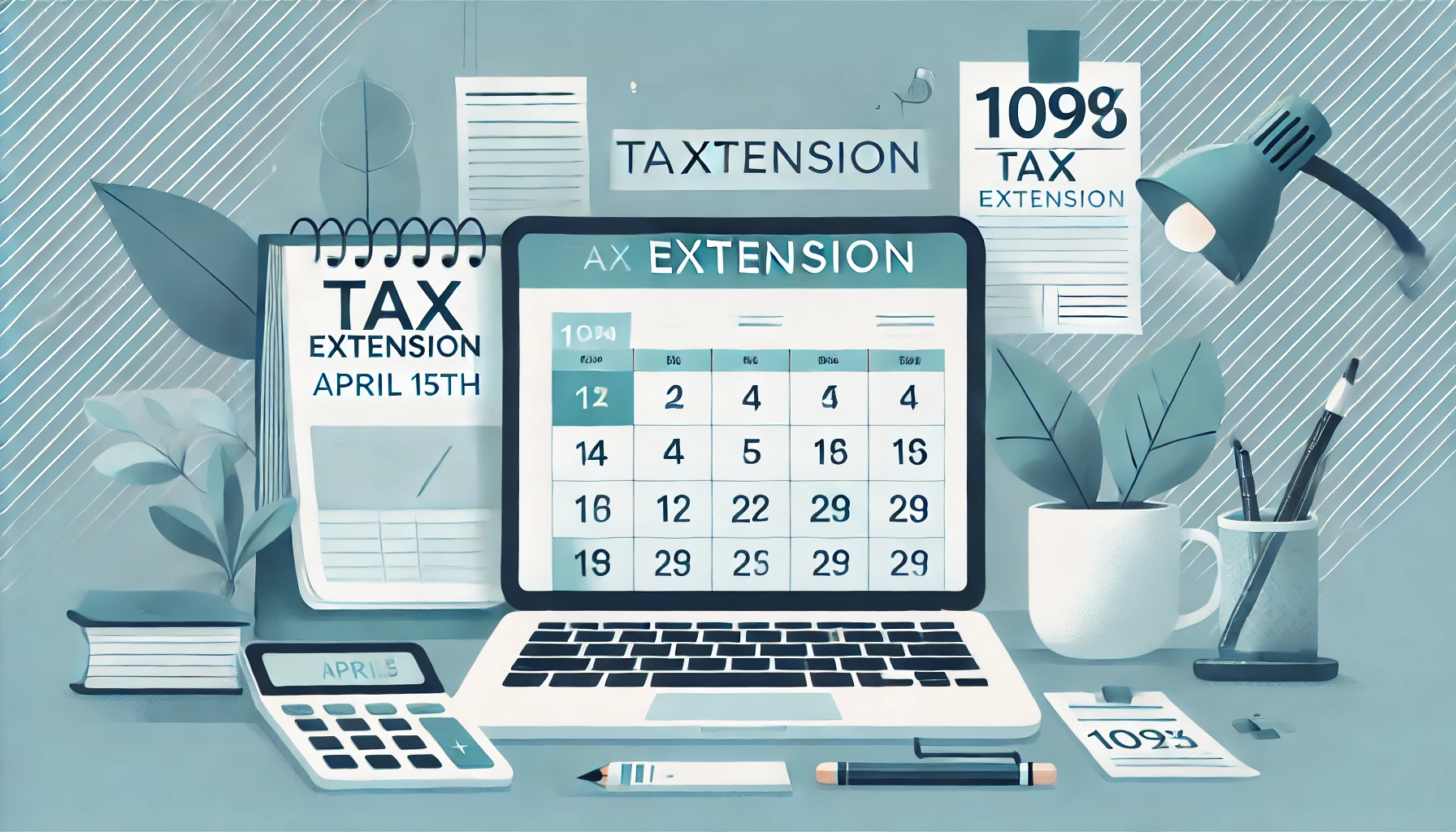
While many people find tax season to be stressful, independent contractors and business owners may find it more difficult to optimize their tax savings and file their taxes correctly. It could be challenging to meet the filing dates due to the complexity of tax rules and the requirement to oversee multiple revenue sources. This is the moment when you can genuinely save your own life by requesting an extension. This post will provide crucial last-minute tax guidance, with an emphasis on when and how to file for an extension. It will also explain how to expedite the procedure by utilizing resources like 1099 tax estimate calculators, online options for paying estimated taxes, and quarterly tax payments.
Understanding When to File an Extension of Tax
The complexities of monitoring income, expenses, and deductions can make paying taxes, especially for independent contractors and business owners, extremely difficult. Freelancers and business owners frequently receive 1099 forms from numerous clients, which can make the tax filing process more difficult than for salaried employees who receive W-2 forms. The subsequent circumstances may necessitate a tax extension:
- Insufficient Documentation: It could take some time to compile the required paperwork, which includes 1099 forms, invoices, and expenditure records for the company. Incomplete or missing documentation may cause the filing process to take longer.
- Complicated Financial Situations: Independent contractors and business owners may run into intricate financial situations involving a number of investments, tax advantages, and revenue streams. This complexity makes accuracy take longer to achieve.
- Optimization of Tax Rebates: It is essential to correctly determine and claim all allowable deductions in order to optimize tax savings. It could take some time to finish this process, particularly for people who handle their own money.
When Should a Tax Extension Be Filed?
Knowing when to submit an application for a tax extension is essential. Individuals have until April 15th to file their taxes to seek for an extension through the IRS. In the following circumstances, it seems reasonable to ask for an extension:
- Unexpected Occurrences: Unexpected things might happen in life, such as illness, family issues, or natural disasters, which can make it difficult to file your taxes on time.
- Inadequate Tax Information: Whether you need more time to arrange your financial records or are awaiting crucial tax documentation, requesting an extension can provide you the breathing room you need.
- Complicated Tax Circumstances: If your tax situation is complicated and involves multiple investments, deductions, or sources of income, you may be eligible for an extension. You’ll have more time to guarantee accuracy as a result.
How to Request an Extension of Tax Time
Requesting a tax extension is a simple procedure. Take a look at our comprehensive guide to assist you:
- Complete IRS Form 4868: The IRS Form 4868, “Application for Automatic Extension of Time to File U.S. Individual Income Tax Return,” must be filed in order to request an extension. This form is available on the IRS website.
- Electronic or Mail Submission: IRS e-file users can electronically submit Form 4868, or they can send it via mail. Electronic submission is quicker and instantly confirms receipt.
- Verify and settle any outstanding taxes: You must estimate and pay any taxes due by the initial filing deadline even if you file for an extension. You can determine your tax liability with the use of a 1099 tax estimate tool. Online tax payments are a simple way to guarantee on-time payment.
- Hold Documents: Please save a copy of Form 4868 and the submission confirmation for your purposes. In the event that the IRS has any inquiries or finds any irregularities, this paperwork is crucial.
Resources for Tax Savings for You
Employing a variety of tools and techniques, freelancers and business owners can optimize tax savings and expedite the filing process. Here are some excellent sources:
Use the 1099 Tax Estimate Calculator first. One of the most useful tools for independent contractors and business owners is a 1099 tax estimate calculator. It uses information regarding your income, deductions, and other financial variables to help calculate your tax burden. You may avoid paying less than the required amount and manage your quarterly tax payments more effectively with the aid of this calculator.
2. Quarterly Tax Payments: Freelancers and business owners must file their taxes with the IRS on a quarterly basis, in contrast to salaried employees. Usually, the months of January, April, June, and September are when these payments are due. If you make these payments on time, you can save a big sum of money on taxes at the end of the year. To find out the exact amount you have to pay each quarter, use a 1099 tax estimate calculator.
Pay Estimated Taxes Online in the Third Step The IRS offers several ways to make online anticipated tax payments easy and convenient. The Electronic Federal Tax Payment System (EFTPS), IRS Direct Pay, and other third-party payment processors are some of your options. Online payments guarantee on-time payments and provide a transaction history.
Common Errors to Steer Clear of
Avoiding frequent errors that could result in fines or delays is the key to a seamless tax filing procedure. The following are some hazards to be aware of:
- Missing the extension deadline: Even if an extension gives you extra time, you still need to file your taxes by the original deadline. Any unpaid taxes may be subject to fines and interest if this deadline is missed.
- Ignoring Your Tax Duties: It’s Important to Figure Out What Your Tax Duties Are. Interest and fines may result from underestimating and underpaying your taxes. To make sure your estimates are accurate, use a 1099 tax estimate calculator.
- Unexpected Taxable Amounts: Businesses and independent contractors are required to pay taxes on a quarterly basis. If this isn’t done, there may be fines and a significant tax penalty at the end of the year. To keep on track, use online payment alternatives and create reminders.
- Not Keeping Records: Make sure you keep detailed records of all your earnings, outlays, and tax payments. It is imperative to have the appropriate documentation in the event of an IRS audit or other problems.
Advantages of Requesting an Extension
There are many advantages to filing for a tax extension, especially for independent contractors and small business owners who are struggling financially. Here are a few benefits:
- Avoid fines: You can avoid late filing penalties by requesting an extension. It’s crucial to remember that an extension does not prolong the deadline for filing any outstanding taxes. To prevent fines and interest, make sure you estimate your taxes and pay them before the first deadline.
- Deeper Accuracy Time: An extension gives you more time to check your financial records, collect the required paperwork, and make sure your tax return is accurate. Errors may go down and deductions may increase as a result.
- Decreased Tension: Tax season may be difficult, particularly for people who are having financial difficulties. You can release some of this pressure and go on more calmly and methodically by requesting an extension.
- Expert Support: If you need extra time to talk with a tax professional, you can ask for an extension. A tax expert can assist you in finding deductions, making sure you are following IRS rules, and deciphering complicated tax legislation.
Verdict
For independent contractors and business owners, tax season can be difficult, but with the correct resources and approaches, it is feasible to optimize tax savings and submit accurate forms. The intricacy of filing taxes necessitates understanding when and how to submit an extension request. Anxiety can be decreased and the process sped up by making use of tools like a 1099 tax estimate calculator, paying estimated taxes online, and timely submitting quarterly taxes. Tax season may go more smoothly if you use the opportunity to request an extension and steer clear of common blunders so you can concentrate on expanding your company.
Read more on WCCO






